New era begins
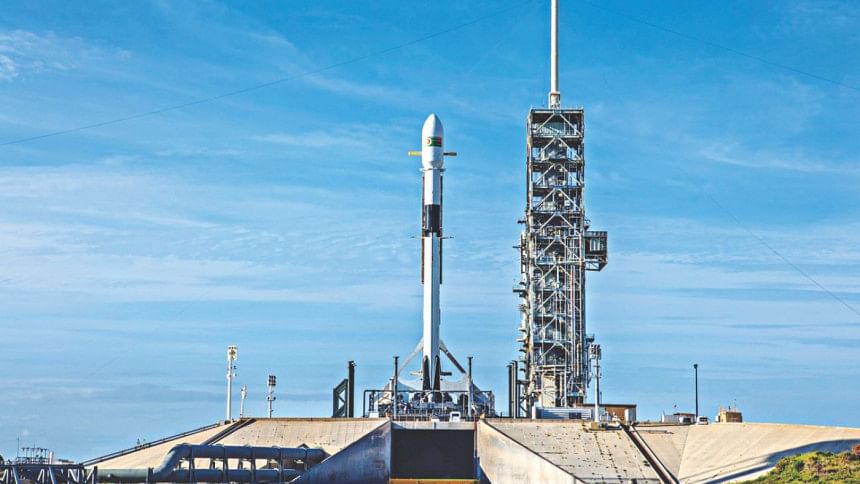
The country's first communication satellite, Bangabandhu-1, is on its way to its orbital slot in space. With the launch of Bangabandhu-1, Bangladesh became the 57th country in the world and fourth in South Asia -- after India, Pakistan and Sri Lanka -- to have its own satellite in space.
The Falcon-9 rocket of SpaceX propelled the satellite into space at 2:14am Bangladesh time today, from Cape Canaveral, Florida.
Minutes after the launch, the rocket went through Max-Q, which according to SpaceX is the time the rocket is pushing against the atmosphere the hardest.
The first stage of the rocket separated moments later and the second stage took over to send the satellite hundreds of kilometres above the earth's surface.
Around eight and a half minutes later, the first stage returned to earth and landed on the recovery vessel 'Of Course I Still Love You' on the Atlantic Ocean, 340 nautical miles away from the launch pad.
Around 28 and a half minutes after liftoff, the second stage cut off engines at over 34,000kmph. Around 33 minutes after liftoff, the satellite was detached from the second stage and Bangabandhu-1 was on its way to its new home at 119.1 degree east.
In a message early today, Prime Minister Sheikh Hasina said, “With this we entered a new era.”
She thanked the satellite building and launching company, the governments and people of the US and France for their help. She also thanked Russia for renting its orbital slot to Bangladesh.
Once the satellite becomes active at its orbital slot, it will be controlled from three stations in the US, Italy, and South Korea for about a month. It will be controlled and maintained from ground stations in Gazipur and Rangamati later on.
Talking about the benefits of the satellite, project officials said it would immensely contribute to the digital advancement of the country.
Currently, Bangladesh meets its demand for satellite connectivity by renting bandwidth from foreign operators, which costs the country about $14 million a year. Bangabandhu-1 could save the foreign currency and its unused capacity could also be rented to other nations.
State owned Bangladesh Communication Satellite Company Ltd will operate the business of the Bangabandhu-1 and has already started the process of renting out capacity to Indonesia and the Philippines.
“… Our main target is to sell the capacity to Indonesia and the Philippines,” said Md Saiful Islam, managing director of the company.
Two other countries also are on the list of prospective buyers, said Saiful, also the additional secretary of the telecommunications ministry.
The satellite will mostly cover South Asian countries and Indonesia, the Philippines, Myanmar, Tajikistan, Kyrgyzstan, Uzbekistan, Turkestan and a part of Kazakhstan.
Bangabandhu-1, which costs Tk 2,765.66 crore, is expected to improve the Direct-to-Home (D2H) service, making people's access to worldwide TV entertainment easier. It will have 40 transponders -- 26 Ku band and 14 C band -- and a number of them will be used for broadcasting TV channels.
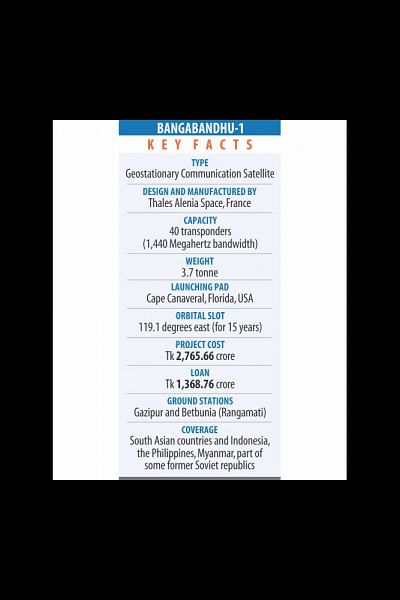
The country's remote parts -- haors, hilly parts, coastal areas and deep-sea zones -- will get internet service from the satellite. It will also be helpful in distance learning and telemedicine services, said officials concerned.
“There are more than 750 union parishads in the country with no internet connectivity and we want to ensure broadband internet with this satellite there,” said ICT Minister Mustafa Jabbar over the phone on Wednesday.
It could provide the nation with dedicated emergency telecommunication services during natural disasters if all other services go offline, Jabbar said, adding, “And this will be the major part of the satellite's benefit.”
Bangabandhu-1 will also be a crucial tool for surveillance and ensuring national security and will be a huge stride towards digitisation, he said.
“There is no doubt that this is the most sophisticated project in the country's history.”
Before leaving for Florida last week, Md Mezbahuzzaman, project director, of the Bangabandhu-1 satellite project, told The Daily Star that the satellite would take about one month to reach its spot in orbit.
“The 3.7-tonne satellite will travel vertically 36,000km up from the launch pad before making adjustments for orbit and it will take 10 days to do that,” Mezbahuzzaman added.
The launch process has two phases. The first is the Launch and Early Orbit Phase which will take 10 days and the second phase is Satellite in Orbit that takes 20 days.
Bangladesh began its venture into space in 2008 when Bangladesh Telecommunication Regulatory Commission sought allocation of orbital slot 102 east from the International Telecommunication Union for launching its own satellite.
But about 20 countries filed a large number of complaints saying that the allocation of that particular slot to Bangladesh would hurt business with their existing satellites.
The BTRC in 2013 negotiated with the Russian-Intersputnik and rented the 119.1 east orbital slot for Tk 221 crore for 15 years. Bangladesh will be able to send three more satellites to the same slot.
Bangladesh has also sought allocation for 69 degree east and 135 degree east.
The BTRC in November, 2015, signed a deal with French company Thales Alenia Space to build the satellite within December 16, 2017.
Initially, the launch was scheduled for Victory Day 2017. However, it was postponed until March this year after Hurricane Irma and subsequent floods hit Florida, said officials concerned.
The launch had been delayed eight times.
Brac University has a nanosatellite in orbit. Its satellite Onnesha was launched last year.
Early yesterday, the Falcon-9 rocket of SpaceX aborted the mission less than a minute before liftoff.
The Falcon-9, the computers of which take over control 60 seconds prior to launch, aborted at T minus 58 seconds due to a false signal from the ground.

 For all latest news, follow The Daily Star's Google News channel.
For all latest news, follow The Daily Star's Google News channel. 


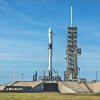

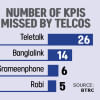
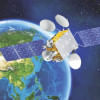


Comments